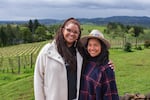When someone mentions the Willamette Valley, wine is often top of mind. The area is home to more than 700 wineries, with some of the region’s vineyards planted by homesteaders before Oregon even became a state.
But the Willamette Valley wine region is also very white. And it’s not just here. According to the Association of African American Vintners, less than 1% of all winemakers in the U.S. are Black.
But there is a sea change happening.

Tiquette Bramlett made history last year by becoming the first Black woman appointed to oversee a winery in a major U.S. wine region. Compris Vineyard (formally Vidon) hired her as their president in 2021. The team also includes, from left, winemaker David Bellows, co-owner Erin Allen, and co-owner Dru Allen.
Foundry 503 / Courtesy of Compris Vineyard
Bertony Faustin became the state’s first Black winemaker in 2008 when he opened Abbey Creek Vineyard, and since then three more Black owned wineries have opened. But it’s not only winemakers pushing for change.
As the president of Compris Vineyard, Tiquette Bramlett is the first Black woman appointed to oversee a winery in a major U.S. wine region. This year, she will help usher in a new crop of BIPOC wine industry changemakers with her nonprofit, Our Legacy Harvested, and its inaugural internship program.
OPB’s Crystal Ligori joined Bramlett and Marcela Alcantar-Marshall, one of the five selected interns, to learn more.
Crystal Ligori: Can we start by talking through the impetus for Our Legacy Harvested? I understand you founded it in 2020, around the time when racial justice protests were happening across the country.
Tiquette Bramlett: So, the background for its start is based around my family. My grandfather was the first Black general contractor in the state of California, and a big thing for our family was always rooted in community. When he started that company, he was having trouble hiring and no one was really connecting him and helping him build community. So when it came to [him] hiring, he was hiring people that were looking for jobs that were coming out of prison, or that for one reason or another, just couldn’t get hired. And so he said, “This is my opportunity to build our own table and to build this community,” and these people are our family as an extension. My [grandparents] were so determined to build this community and provide education, and if [their community was] hungry for certain knowledge, they were going to figure out a way to raise the funds to get them the necessary education. He always said it’s our legacy harvested. And that’s always something that stayed with me.
In 2020, I had been hearing things in our wine community and people saying, “I don’t necessarily feel safe here. I don’t necessarily feel as though there’s space for me. I don’t feel as though I have community.” That bothered me because part of me felt as though I hadn’t been doing my job of what my family has been gifted. I pride myself on being a connector and being able to build that community. If I can, I facilitate that space for people. Diana Riggs at Mac Market and I were sitting down over a bottle of Elena Rodriguez’s Alumbra rosé and that was where everything came to be. We wanted to bring some levity, and people were asking us how to support BIPOC businesses. That’s where our block party was born. That’s when I started having the big dreams of saying, “Why can’t we have our education platform? Why can’t I have my campus? Why can’t I have this?” I can and I want it and I’m going to do it!
Ligori: And you have selected the inaugural interns for Our Legacy Harvested’s BIPOC internship program. Marcela Alcantar-Marshall is one of them. Can you tell me about what caught your eye about this internship?
Alcantar-Marshall: Having a civil engineering background, I’ve always been into the earth and how things are made. So when I moved out to Carlton from Beaverton, I was interested in the agriculture side of the country, and I didn’t actually realize that there was so much wine out here. So when I started to follow people on social media, one of the companies that I followed was Alumbra Cellars — a Latino-owned business — and she had posted the internship. I was like, “This is awesome. This is what I’m looking for.” I wanted to be in agriculture and be able to get involved in this kind of community building process, too.

Founder of Our Legacy Harvested, Tiquette Bramlett, with one of their inaugural 'OLH Cru' interns Marcela Alcantar-Marshall at Compris Vineyard. The internship program will bring 5 BIPOC individuals to the Willamette Valley to train with a Diversity, Equity, and Inclusion (DEI)-trained winery.
Foundry 503 / Courtesy of Compris Vineyard
Ligori: What will the internship be like, what are folks going to be learning?
Bramlett: We are building out specific programming for each individual, so they’re going to have group programming and they’re going to have individual programming. Part of their interview process was specifically asking them what their desire was and what their ultimate goal is to get out of this. That was the exciting part for us because we want it to be mutually beneficial; we want them to get their ultimate experience out of this, but also we want them to have personal growth because it is about wellness as well.
We are basically going through the who, what, when, where and why? So, why people have fallen in love with this industry. They’re going to have a really hands-on agricultural experience and learn from vineyard stewards, but also vineyard managers. [They’ll] see the large experience and the smaller scope to see what that entire experience looks like. We really want to change the game of how this is done … so they can see all the different facets of the industry, of where they can fit in here. There’s no limit to where they can go in the wine industry.
Ligori: I’d love to talk a little bit about Tiquette, you being a Black leader in Oregon’s wine industry and Marcy you being the new crop of BIPOC folks who are going to be making changes in an industry which feels very white.
Alcantar-Marshall: Growing up in Oregon, I’m kind of used to the fact that there isn’t a lot of brown, Indigenous people. To be there, you start to give the next generation an idea of, “Well, if they were there, then I can do it too.” So that’s kind of what I’m hoping with this, is just being able to be seen and [have someone realize], “I look like them and I can be part of this community.”
Working in construction, you don’t see a lot of women and my daughter, whenever they ask on career day, what do you want to be? [She says], “I want to be a construction worker,” because she sees it’s normal. And I want the same experience with wine because I didn’t understand the wine culture. It was very intimidating. And I think being Indigenous and brown, it becomes even more standoffish. So, hoping that if we’re here, just our presence alone will invite people to want to be part of it.
Bramlett: I like to say we’re in the growing pains of the wine industry. I hate to make it sound this easy and use the Nike phrase, but it’s like, “Just Do It.” You know, hire the people. You will make mistakes, everybody makes mistakes, nobody is perfect. But at the end of the day, you’re going to start making those changes and seeing the diversity in your space. I realized that Oregon has a complicated history, but we’re in a day and age now where we have the opportunity to change that.

